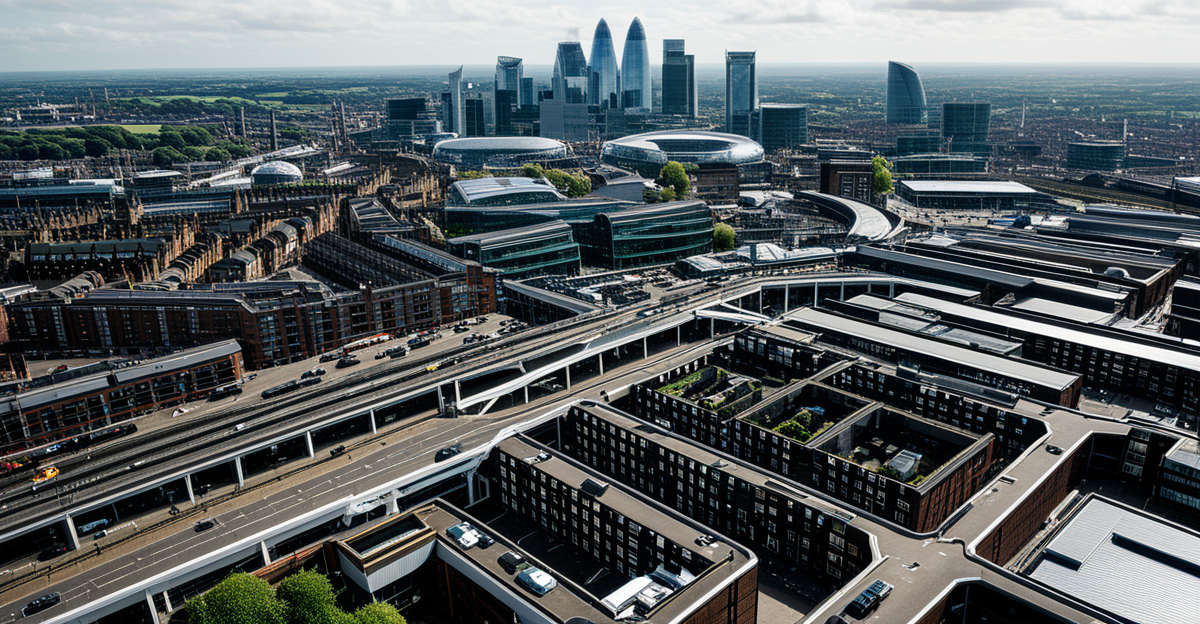Advancements in UK Smart City Technologies
The UK stands at the forefront of smart city technology, leveraging innovation to revolutionize urban living. Central to this transformation is the deployment of Internet of Things (IoT) devices, which create interconnected urban environments by collecting and sharing data in real time. This data fuels advanced analytics, allowing city administrators to optimize resources, improve public services, and enhance citizen experiences.
A key focus lies in building scalable digital infrastructure that can support diverse urban solutions. This includes robust broadband networks and cloud platforms capable of handling vast data flows securely and efficiently. Automation technologies further streamline operations, from street lighting to waste management, contributing to more responsive and sustainable cities.
This might interest you : Unleash your creativity with the dnd token maker online
The UK’s commitment to these technologies ensures cities can adapt quickly to evolving demands, such as population growth and climate change. For example, IoT sensors monitor air quality and traffic patterns to inform dynamic policy decisions. By continuously expanding digital infrastructure and embracing innovation, the UK smart city technology ecosystem fosters smarter, cleaner, and more efficient urban environments. This comprehensive approach places the UK as a global leader in smart city development, underpinned by cutting-edge technology and forward-thinking urban planning.
Major Smart City Projects in the UK
The UK leads smart city projects by blending city innovation with practical urban technology initiatives. London smart city efforts exemplify this approach, focusing on digital solutions tailored to dense urban challenges. Key projects involve integrating IoT sensors to monitor air quality, traffic, and energy usage, providing real-time data that drives efficient city management.
Additional reading : How Can Technology Revolutionize the UK’s Educational System?
Collaboration between public and private sectors fuels progress. Local governments work with tech firms to deploy cutting-edge systems, ensuring solutions meet community needs. For instance, Manchester’s initiatives emphasize connected infrastructure to improve mobility and environmental monitoring, illustrating how tailored innovation addresses distinct urban demands.
These projects prioritize scalable digital infrastructure, enabling seamless data collection and analytics across city systems. This infrastructure supports adaptive services, from smart lighting to dynamic traffic control, enhancing sustainability and quality of life. The intersection of innovation and infrastructure underscores the UK’s ability to pilot effective smart city frameworks, setting a strong precedent for future urban technology initiatives. Implementing such projects not only transforms city living but also creates a blueprint replicable across other UK urban centers.
Advancements in UK Smart City Technologies
The UK’s leadership in smart city technology is rooted in its commitment to innovation and a strong focus on scalable digital infrastructure. Core technologies such as the Internet of Things (IoT), data analytics, and automation drive this transformation by enabling cities to collect and interpret vast amounts of urban data in real time.
IoT devices are embedded across city environments, capturing data on everything from traffic to environmental conditions. When combined with advanced data analytics, this information allows for evidence-based decision-making that improves efficiency and responsiveness. For example, automated systems can adjust street lighting or waste collection schedules, reducing energy use and operational costs.
A key priority lies in developing resilient digital infrastructure that can support these expanding smart city systems. This means not only robust broadband networks but also cloud-based platforms capable of processing and securing the data generated. Without scalable infrastructure, technologies like IoT and automation cannot reach their full potential.
Through steadily strengthening this foundation, the UK fosters urban innovation that can adapt to future challenges such as population growth and climate change. The synergy of innovation and digital infrastructure underpins the UK’s status as a global pioneer in smart city development.
Advancements in UK Smart City Technologies
The UK smart city technology landscape thrives on continuous innovation and robust digital infrastructure. Central to this is the integration of the Internet of Things (IoT), which embeds sensors across urban environments to collect real-time data. This data feeds intelligent automation and sophisticated data analytics, enabling cities to optimize services such as energy management, transportation, and waste collection.
Key technologies driving this transformation include IoT devices, capable of monitoring numerous urban factors simultaneously, and analytics platforms that convert raw data into actionable insights. Automation systems then execute decisions dynamically to improve efficiency and resource allocation. For instance, adaptive street lighting adjusts based on pedestrian or vehicle presence, reducing unnecessary energy consumption.
A critical focus remains on scalable digital infrastructure that supports these advanced solutions securely and efficiently. This requires high-capacity broadband networks paired with cloud-based storage and processing facilities designed to grow with urban demands. Without this foundation, the potential benefits of UK smart city technology could stall.
By prioritizing innovation alongside scalable infrastructure, the UK ensures its smart city initiatives remain resilient and adaptable, meeting challenges from population growth to environmental pressures while refining urban experiences.
Advancements in UK Smart City Technologies
The UK smart city technology landscape is propelled by continuous innovation and a firm commitment to scalable digital infrastructure. At the core, the United Kingdom employs cutting-edge technologies such as the Internet of Things (IoT), advanced data analytics, and automation systems to transform urban living.
IoT devices are extensively embedded in urban environments, collecting real-time data on traffic flow, environmental conditions, and energy consumption. This data, processed through sophisticated analytics platforms, provides actionable insights for city administrators to optimize resources and services efficiently. For instance, adaptive lighting systems and dynamic waste collection schedules reduce both energy consumption and operational costs.
Developing scalable digital infrastructure is vital for sustaining these smart city technologies. This includes high-capacity broadband networks and cloud-based services capable of handling vast data securely while accommodating future growth. Without this foundation, innovation-driven solutions like IoT and automation could not scale effectively or provide the expected benefits.
By integrating these technologies within resilient, adaptable infrastructure, the UK’s smart city initiatives maintain agility to address challenges such as urban population growth and environmental pressures, thereby reinforcing the nation’s leadership in smart city development.
Advancements in UK Smart City Technologies
The UK smart city technology sector leads globally by integrating cutting-edge innovations such as the Internet of Things (IoT), advanced data analytics, and automation into urban environments. These technologies collectively enable cities to collect, analyze, and act upon real-time data, enhancing service delivery and operational efficiency. For example, IoT sensors gather vital information on traffic, air quality, and energy consumption, which analytics platforms transform into actionable insights.
Scalable digital infrastructure is crucial to support this data-driven ecosystem. High-capacity broadband networks and resilient cloud platforms ensure that data flows seamlessly and securely across systems, allowing automation to adjust street lighting or waste collection dynamically. Without such foundation, the potential of IoT and other innovations cannot be fully realized.
Innovation in the UK smart city landscape is tightly linked to this robust infrastructure. This synergy enables cities to adapt effectively to challenges such as population growth and environmental pressures. It also drives ongoing improvements in urban living standards by providing flexible and efficient solutions. By continuously expanding and upgrading its digital infrastructure, the UK sustains its leadership in smart city development, harnessing technology to create responsive, sustainable urban environments.










